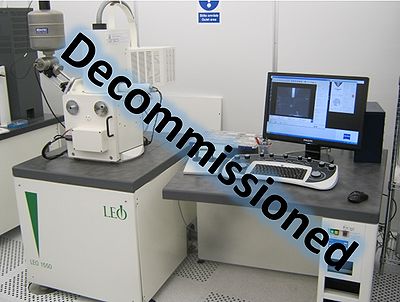Specific Process Knowledge/Characterization/SEM LEO: Difference between revisions
| (20 intermediate revisions by 4 users not shown) | |||
| Line 1: | Line 1: | ||
{{cc-nanolab}} | |||
'''Feedback to this page''': '''[mailto:labadviser@ | '''Feedback to this page''': '''[mailto:labadviser@nanolab.dtu.dk?Subject=Feed%20back%20from%20page%20http://labadviser.nanolab.dtu.dk/index.php/Specific_Process_Knowledge/Characterization/SEM_LEO0 click here]''' | ||
<br> | |||
<br> | |||
'''<p style="color:red;">The SEM LEO has been decomissioned and relocated to DTU Mechanics in 2020.</p>''' | |||
=SEM LEO= | =SEM LEO= | ||
[[image:IMG_3290.jpg|400x400px|right|thumb|The SEM LEO located in cleanroom F-2]] | |||
The SEM LEO was a very reliable and rugged instrument that provided high quality SEM images of most samples and it served the users of the cleanroom for many years. Excellent images on a large variety of materials such as semiconductors, semiconductor oxides or nitrides, metals, thin films and some polymers were acquired by the thousands on the SEM. | |||
In her later years the SEM LEO was equipped with a Raith e-beam lithography system and was exclusively dedicated to the users of the Raith E-beam lithography. | |||
===Typical current values for EBL=== | |||
Reported values are the average of five measurements from Elphy Quantum using the EBL holder's Faraday cup. All values in pA. | |||
{| border="1" style="text-align: center; width: 320px; height: 200px;" | |||
|- | |||
|colspan="6" style="text-align: center;" style="background: #efefef;" | '''LEO - Current measurements 11/02/2017''' | |||
|- | |||
!scope="row" | | |||
!|5kV | |||
!|10kV | |||
!|15kV | |||
!|20kV | |||
|- | |||
|- | |||
!10um | |||
|13 | |||
|17 | |||
|20.5 | |||
|25 | |||
|- | |||
|- | |||
!20um | |||
|62 | |||
|87 | |||
|105 | |||
|127 | |||
|- | |||
|- | |||
!30um | |||
|160 | |||
|175 | |||
|215 | |||
|264 | |||
|- | |||
!60um | |||
|510 | |||
|680 | |||
|850 | |||
|1040 | |||
|} | |||
==Equipment performance | ==Equipment performance== | ||
{| border="2" cellspacing="0" cellpadding="2" | {| border="2" cellspacing="0" cellpadding="2" | ||
| Line 41: | Line 69: | ||
|style="background:LightGrey; color:black"|Imaging and measurement of | |style="background:LightGrey; color:black"|Imaging and measurement of | ||
|style="background:WhiteSmoke; color:black"| | |style="background:WhiteSmoke; color:black"| | ||
* | * Conducting samples | ||
* Semi-conducting samples | |||
* Thin (~ 5 µm <) layers of non-conducting materials such as polymers | |||
|- | |- | ||
|style="background:LightGrey; color:black"|Other purpose | |style="background:LightGrey; color:black"|Other purpose | ||
| Line 50: | Line 80: | ||
|style="background:LightGrey; color:black"| | |style="background:LightGrey; color:black"| | ||
|style="background:WhiteSmoke; color:black"| | |style="background:WhiteSmoke; color:black"| | ||
*Cleanroom of DTU | *Cleanroom of DTU Nanolab | ||
|- | |- | ||
!style="background:silver; color:black;" align="center" width="60"|Performance | !style="background:silver; color:black;" align="center" width="60"|Performance | ||
| Line 87: | Line 117: | ||
|style="background:LightGrey; color:black"|Batch size | |style="background:LightGrey; color:black"|Batch size | ||
|style="background:WhiteSmoke; color:black"| | |style="background:WhiteSmoke; color:black"| | ||
* | *Wafers up to 6" (only full view up to 4") | ||
|- | |- | ||
| style="background:LightGrey; color:black"|Allowed materials | | style="background:LightGrey; color:black"|Allowed materials | ||
Latest revision as of 13:03, 17 September 2025
The content on this page, including all images and pictures, was created by DTU Nanolab staff, unless otherwise stated.
Feedback to this page: click here
The SEM LEO has been decomissioned and relocated to DTU Mechanics in 2020.
SEM LEO

The SEM LEO was a very reliable and rugged instrument that provided high quality SEM images of most samples and it served the users of the cleanroom for many years. Excellent images on a large variety of materials such as semiconductors, semiconductor oxides or nitrides, metals, thin films and some polymers were acquired by the thousands on the SEM.
In her later years the SEM LEO was equipped with a Raith e-beam lithography system and was exclusively dedicated to the users of the Raith E-beam lithography.
Typical current values for EBL
Reported values are the average of five measurements from Elphy Quantum using the EBL holder's Faraday cup. All values in pA.
| LEO - Current measurements 11/02/2017 | |||||
| 5kV | 10kV | 15kV | 20kV | ||
|---|---|---|---|---|---|
| 10um | 13 | 17 | 20.5 | 25 | |
| 20um | 62 | 87 | 105 | 127 | |
| 30um | 160 | 175 | 215 | 264 | |
| 60um | 510 | 680 | 850 | 1040 | |
Equipment performance
| Equipment | SEM LEO (Leo 1550 SEM) | |
|---|---|---|
| Purpose | Imaging and measurement of |
|
| Other purpose |
| |
| Location |
| |
| Performance | Resolution |
The resolution is strongly dependent on the type of sample and the skills of the operator. |
| Instrument specifics | Detectors |
|
| Stage |
| |
| Electron source |
| |
| Operating pressures |
| |
| Options |
| |
| Substrates | Batch size |
|
| Allowed materials |
| |
